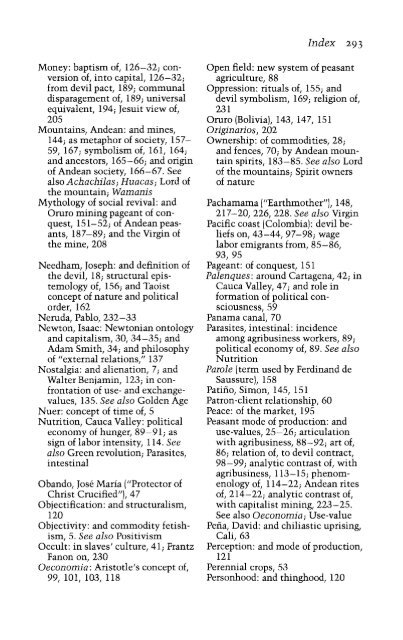The Devil and Commodity Fetishism in South America - autonomous ...
The Devil and Commodity Fetishism in South America - autonomous ...
The Devil and Commodity Fetishism in South America - autonomous ...
Create successful ePaper yourself
Turn your PDF publications into a flip-book with our unique Google optimized e-Paper software.
138 <strong>Devil</strong> <strong>and</strong> <strong>Commodity</strong> <strong>Fetishism</strong> <strong>in</strong> <strong>South</strong> <strong>America</strong><br />
noth<strong>in</strong>g but itself <strong>in</strong> order to exist" (1967:113). In other words, the<br />
mean<strong>in</strong>g or identity of a th<strong>in</strong>g is given <strong>in</strong> itself alone, rather than <strong>in</strong><br />
the context of which it is part. Second, as Whitehead also po<strong>in</strong>ts out,<br />
by virtue of such decontextualization, relationships between th<strong>in</strong>gs<br />
(<strong>and</strong> changes of th<strong>in</strong>gs or their relationships) are conceived of as external<br />
to the th<strong>in</strong>gs themselves. <strong>The</strong>se concepts compel recourse to<br />
a type of deism <strong>and</strong> fetishism, which is how Newton himself conceptualized<br />
the cosmos of otherwise atomized th<strong>in</strong>gs.<br />
<strong>The</strong> fetishism that is <strong>in</strong>herent <strong>in</strong> the Cauca Valley beliefs arises<br />
from a quite contrary metaphysic <strong>and</strong> set of social preconditions. In<br />
the peasant <strong>and</strong> work<strong>in</strong>g-class epistemology <strong>in</strong>dividual terms or<br />
th<strong>in</strong>gs are conceptualized as are Hegel's "moments": each expresses<br />
the totality of which it is the manifestation. Th<strong>in</strong>gs conta<strong>in</strong> the totality<br />
with<strong>in</strong> themselves, so to speak, <strong>and</strong> can be seen causally, act<strong>in</strong>g<br />
on <strong>and</strong> acted upon by other constituents. But they are of <strong>in</strong>terest<br />
here primarily as ciphers <strong>and</strong> signs that echo the mean<strong>in</strong>g of the system<br />
that society forms with them.<br />
I, too, have chosen, <strong>and</strong> <strong>in</strong>deed felt forced, to <strong>in</strong>terpret them <strong>in</strong><br />
this sense, rather than see a world of atoms swimm<strong>in</strong>g mechanically<br />
<strong>in</strong> the ethereal vapors of time <strong>and</strong> space. Marxism itself rests on<br />
an acute appreciation of such a perspective (cf., Oilman, 1971), although<br />
this is commonly ignored because subsequent <strong>in</strong>terpreters<br />
understood his notion of materialism to be the same as that of bourgeois<br />
science, mechanical <strong>and</strong> empirical.<br />
In conclusion, it bears repeat<strong>in</strong>g that, although the analogical<br />
structures can be <strong>in</strong>verted <strong>and</strong> relationships can be transformed, <strong>in</strong><br />
the examples drawn from the Cauca Valley, where one mode of production<br />
is displac<strong>in</strong>g another, the ethics <strong>and</strong> reason of use-value are<br />
be<strong>in</strong>g ma<strong>in</strong>ta<strong>in</strong>ed. <strong>The</strong> metaphysics that underlie the analogical<br />
mode have not been disowned even though the peasants now own<br />
little else than their abstract labor power. <strong>The</strong> analogies are not neutral,<br />
despite the neutraliz<strong>in</strong>g <strong>in</strong>fluence of the fact-value dist<strong>in</strong>ction<br />
that is <strong>in</strong>tr<strong>in</strong>sic to modern science <strong>and</strong> economic theory, <strong>in</strong> which it<br />
is held that "economics is entirely neutral between ends; that <strong>in</strong> so<br />
far as the achievement of any end is dependent on scarce means, it is<br />
germane to the preoccupations of the economist. Economics is not<br />
concerned with ends as such" (Robb<strong>in</strong>s, 1935 '.24}.<br />
Noth<strong>in</strong>g could be further from the economic theory <strong>and</strong> behavior<br />
of the peasants <strong>and</strong> field h<strong>and</strong>s <strong>in</strong> the southern Cauca Valley, for<br />
whom, economics is totally concerned with ends. Whether it is economic<br />
or whatever, reason is for them far more than the narrow concern<br />
with the maximal coord<strong>in</strong>ation of scarce means to alternate<br />
ends. Rather, reason is that which embodies the conditions of objec-
















